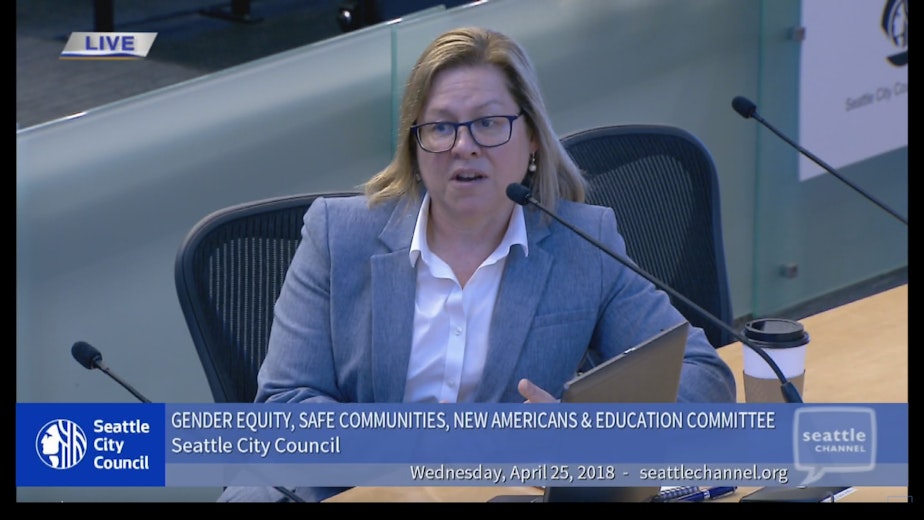Seattle's new inspector general ready to dive into police issues, community outreach

Seattle’s new Inspector General Lisa Judge said she will be looking at how Seattle police officers use canines, creating best practices for police interrogations, and how to retain officers at SPD — and that’s just part of this year’s work plan.
Judge released her first report this week: a review of the Seattle Police Department’s firearms inventory procedures, after an internal complaint flagged missing firearms. Judge found eight firearms unaccounted for in recent decades.
Inventories did not always include guns “forfeited” to SPD, and guns on loan to the Seattle Municipal Court and fire marshals, her report found. Judge said SPD has already taken action to correct its recordkeeping.
“They had already, to their credit, corrected some of these and addressed the deficiencies at time we were doing this report, so they caught some on their own,” she said.
In a written response to the Office of Inspector General report, SPD Chief Carmen Best said she “completely” agrees with the OIG recommendations and may go farther.
“I question whether the past practice of SPD ‘loaning’ firearms to non-SPD employees, even if they hold appropriate commissions, is consistent with today’s best practices, and I will be tasking my staff, including my legal advisor, to follow up with additional review,” she said. Best’s letter thanked Judge “for the thorough, thoughtful, transparent and collaborative manner in which your auditors undertook this review.”
Judge was confirmed just over a year ago. She’s in charge of investigating trends affecting SPD, and auditing the investigations performed by another civilian watchdog, the Office of Police Accountability. Now that her office is staffed and open in Seattle’s municipal building, Judge said she’s ready to get moving on some big issues, and to step up her community outreach.
The topics she’ll be examining this year include:
Whether SPD officers adhere to department policies when serving on task forces with other agencies.
At SPD, “There are very good controls in place for determining how officers use force, how they report force, how it’s investigated, how they deal with persons in mental health crisis, how to interact with persons in an immigration context,” Judge said. “I think the presumption is that if you’re an SPD officer, you’re operating under SPD policies anywhere", she said. “But we just want to take a look at that and get a sense of, how many of these kinds of arrangements exist.”
Best practices for interrogations.
“That was a topic I came to Seattle wanting to do something about,” Judge said. “and it was also something that was flagged by the [Community Police Commission] as an issue on their radar as well.” Judge said she’s engaged an expert on the best ways to interview victims, witnesses and suspects. She wants to develop training tailored to needs of officers and the community. “I’ve long been concerned about the issue of wrongful convictions, and it’s beyond debate that people confess to crimes they didn’t commit for varying reasons,” she said. “There’s real intersection between good policing and the defense of people’s civil rights.”
The use of canines by SPD.
The OIG work plan said that the audit will look at whether canines are deployed in a manner consistent with SPD policy and goals of the 2012 federal consent decree to curb excessive force. It added that this audit was formulated “in response to recent canine deployments reviewed by the Seattle Police Department Force Review Board.”
Sponsored
Officer retention at SPD.
“We want to do a deep dive into why officers are leaving SPD and hopefully add something to the conversation about what can be done to stem that,” Judge said.
Judge is also doing an assessment of SPD’s Force Review Board. When the city negotiated its labor contract with the Seattle Police Officers Guild, Judge raised concerns over whether the contract would restrict her to being an observer at Force Review Board meetings rather than a participant. But now she said she thinks acting as an observer is the appropriate role for her office. “I don’t think it’s really something that serves the OIG role to become individually involved in cases or instances,” she said. “Our role is more of systemic oversight, paying attention to trends and patterns that are potentially troublesome.”
Judge said she’s not sure whether U.S. District Judge James Robart’s recent order finding Seattle out of compliance with the federal consent decree in terms of its accountability system will have any bearing on her office. The OIG post was created under the 2017 police accountability law and approved in the recent SPOG contract. But now the city may have to reopen those contract negotiations.
“[Judge Robart’s] order is not very specific,” Judge said. “So I will be interested to see what the city, the monitor and the Department of Justice come up with in terms of identifying the areas of accountability that are impacted by the contract – and the plan to go forward."




